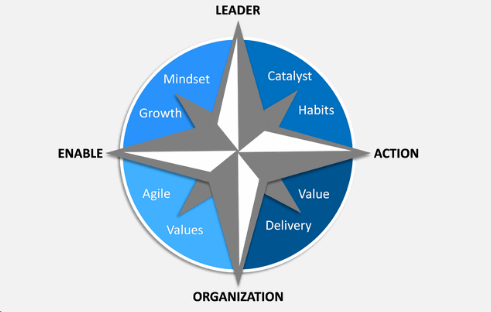A structured organization must have effective leadership to succeed. By establishing and achieving business objectives, company executives are responsible for determining and guiding an organization in the right direction. Every employee needs to develop leadership skills, even if they are not in a position of authority, to increase output and productivity.
In this piece, we examine what leadership is, how to be a great leader and the advantages of having good leadership qualities. ‘What does leadership mean to you’, as asked in interviews, will also be made easier for you to answer with the help of this article.
Table of Contents
What Does Leadership Mean to You?
“What does being a leader mean to you?” is a question whose answers vary from individual to individual. Generally speaking, leadership involves directing and inspiring a team or an individual to accomplish a particular objective. Leaders encourage followers to take the actions required for success. Understanding and honing the necessary skills is the first step to becoming a successful leader. Thankfully, anyone can learn these techniques with time and effort. Every organization has leaders at every level, from CEOs and senior executives to supervisors and project managers.
You could even lead a meeting or train new hires as an entry-level associate by utilizing your leadership abilities. Each leader may have a unique leadership style or a mix of styles, depending on the team and circumstance. There are a variety of leadership styles to choose from, including:
- Transactional: establishes predetermined rewards for achieving objectives
- Transformational: concentrates on establishing and achieving company objectives
- Autocratic: prioritizes efficiency in setting goals
- Democratic: listens to team members’ ideas and incorporates them
Why Do Employers Ask, ‘What Does Leadership Mean to You?’
Employers ask you this question to find out how you feel about leadership, what you think a leader should be like, and what qualities you look for in a leader. Employers can use this information to determine whether you’d fit in with the company by getting a better understanding of your personality. Whether or not you are applying for a managerial position, how you respond to this question says a lot about your self-assurance and personal principles.
Employers who are considering you for a managerial position can use this question to determine the type of leader you will be and whether your leadership style will fit well with the company. It enables them to get a better understanding of your management style and what to anticipate from you as a manager.
This question aids employers in determining what qualities you value in a leader, the type of leadership you respond to, and your level of confidence in your skills and abilities if you are not applying for a managerial position. Those at all levels of an organization can exercise leadership; it is not just a responsibility of those in managerial roles. Even if you are not in a managerial position, employers use this question to gauge your capacity for teamwork and innovation.
How to Answer, ‘What Does Leadership Mean to You?’
Here are some steps to help prepare for questions about leadership during an interview:
1. First, Consider the Traits of Good Leaders That You Admire
Make a list of the role models you have in your life for good leadership. It may include coworkers, former bosses, members of your family or close friends, or well-known individuals. Think about the traits that best represent each person on your list. Take a moment to reflect on the qualities you admire and wish to cultivate. Consider whether the successful leaders you have in mind have anything in common. These are the qualities of a good leader.
2. Second, Consider the Traits of Poor Leaders You Might Know
For individuals in your life who are poor role models, repeat the first step. Think about what it is about their leadership style that makes them ineffective. Take into account the characteristics they have in common; these characteristics make a bad leader. Consider how you could improve their leadership techniques.
3. Then, Study Leadership Skills
Learn more about the various qualities that make a good leader by researching leadership skills. Determine the abilities you already possess and the ones you hope to acquire. Both how you treat others and how you treat yourself matter in leadership. Without a title or position of power, you can still be an effective leader.
4. Next, Define Your Own Leadership Philosophy
To help you define what leadership means to you, compare and contrast the characteristics of effective and ineffective leaders. Find the qualities that best describe your character and that you can develop to become a stronger leader. It is easier to express what leadership means to you clearly if you have developed your own leadership philosophy.
5. Lastly, Use the S.T.A.R. Method
Once you’ve defined what leadership means to you, consider your professional history and come up with an instance in which you showed leadership. When describing the incident, use the S.T.A.R. (situation, task, action, results) method by explaining the situation, the task you had to complete, the action you took and the results you achieved. This gives you the chance to respond to the inquiry, “What does leadership mean to you?’ and provide an example of when you have demonstrated leadership accordingly.
‘What Does Leadership Mean to You?’ Example Answer
Here is an example response to the question, “What does leadership mean to you?’:
‘Leadership is about motivating others to collaborate to achieve a common objective. It enables and inspires people to produce their best work. Understanding your own and the team’s strengths and weaknesses is the first step in being a leader. Next, you must use the team’s strengths to make up for each member’s weaknesses and overcome seemingly insurmountable obstacles. It involves realizing that a team is greater than the sum of its parts and that people perform at their best when they collaborate.’
Consider what a good leader is to you, the traits they exhibit, and the skills that are necessary to be a good leader when attempting to answer this question for yourself.
How to Become An Effective Leader
You can learn how to become a successful leader by following a few simple steps. Being a great leader requires patience and experience. Some people spend their entire professional careers trying to figure out what it takes to be a good leader. With the following steps, you can start developing essential leadership skills and honing your personal management style:
1. Search for a Mentor
Finding the leadership techniques that work best for you can be aided by a mentor. They can show you how to recognize the appropriate skills and qualities and how to apply them. They can help you develop goals for enhancing areas that need improvement. You can look for a mentor at your current employer, from your previous employers, or through your professional network.
2. Do Some Research
Books, online articles, and podcasts are just a few of the places you can find out more about how to be a successful leader. You can learn about the abilities of leaders you look up to and how they apply those abilities to their goals by doing research on them. By doing this, you can get a sense of the skills you still need to learn, hone, or develop.
3. Remember to Practice
Your time and efficiency are maximized when you set goals and work toward achieving them, increasing your chances of success. To continue forming good leadership habits, practice them. By practicing, you can keep track of what works and where you can get better by learning more.
4. Register for a Training Program
There are numerous leadership development programs offered both in-person and online, including group seminars and one-on-one sessions. You can learn more about good leadership techniques and how to use them by enrolling in a leadership course. You could also find out if your company offers any leadership development programs.
5. Determine Your Leadership Strategies
It is useful to research and determine the leadership philosophies that are most effective for you, your group, and your company. Most leaders use a mix of styles as their team’s requirements change. You could deal with situations more effectively if you knew which strategies to combine and use in which situations.
6. Inquire About Feedback
You can ask for constructive criticism from your team to help you get better, just like individual contributors should get regular feedback on their performance. The members of your team ought to be able to pinpoint what went well and offer suggestions for how to do things better. Then, you can put that knowledge to use to develop your leadership abilities.
Characteristics of a Good Leader

It is important for leaders to possess a variety of soft skills. Excellent technical expertise about your team and industry are essential for great leadership. As you work to improve your leadership abilities, here are some skills to consider developing:
Flexibility
As a leader, you frequently interact with a variety of people, systems, and tasks. Often, these components can change. Understanding when to be flexible facilitates process optimization and inspires team members to develop their expertise. For instance, you might observe that a team member is getting better at a brand-new task. Assign them tasks that will help them further develop this new skill rather than having them finish the rest of their original work.
Empathy
Gaining more insight into those around you, as well as developing relationships and trust, can all be facilitated by practicing empathy. Make yourself accessible to them so you can hear about their successes and difficulties and, if necessary, provide them with direction and support. Understanding your team’s actions will enable you to create plans that are more effective as you work toward your goal.
Decisiveness
You might have to make some challenging choices in your role as a leader. Making decisions in a timely, thoughtful, and logical manner is advantageous. Use decision-making tools like data or SWOT analyses to help you make wise choices. Making better decisions can be aided by taking the time to think back on your previous experiences and the choices made by others.
Communication
Effective communication can help to reduce conflict and boost productivity. Additionally, it may promote improved teamwork. Maintain open lines of communication with your team and be sure to share your vision with them, along with any changes that come about as you work toward it. Active listening is a key component of successful communication. You can comprehend the requirements and opinions of those around you by engaging in active listening. To ensure that everyone on your team is aware of what is expected of them, be as specific as you can when communicating with them.
Problem Solving
It is possible for workers across all levels, sectors, and positions to face particular difficulties occasionally. A good leader is someone who can handle obstacles with composure and success. Sharing practical solutions with the rest of the team is an essential component of good problem-solving. The ability to solve problems helps leaders take action more quickly, overcome challenges with their team and outside teams, and guarantee the timely completion of projects in accordance with standards.
Dependability
Employees frequently seek out a reliable and trustworthy leadership figure at work. A trustworthy leader delivers on promises and executes plans. A resourceful leader can create dependable teams and strong relationships that can overcome obstacles successfully.
Why Are Leadership Skills Beneficial?

Being Able to Identify Your Strengths and Weaknesses Quickly
You must identify your strengths and areas for improvement as a leader. By doing this, you and the people you lead are able to work at your best. During team projects and meetings, you can gain a deeper understanding of your personal strengths and limitations because your team frequently amplifies and reflects them.
Understanding the Direction of the Company Better
You need to become more knowledgeable about your company’s goals as you assume more leadership responsibilities. You can align your goals to achieve success in the business by becoming more aware of the viewpoint of your organization. Setting shared and clear goals with your team will also help.
Improving Your Team’s Motivation
Finding the most effective way to motivate your team—whether through praise, rewards, or other forms of support—helps you develop as a leader. A strong sense of team motivation can boost output and morale. A team that is motivated will be more effective and speedy in achieving its objectives.
Bringing Your Team Together
A clear vision or objective is necessary for effective leadership. When your team is fully aware of your objectives, they can define the path you need to take. Collaboration is aided when everyone on your team is aware of your objectives and duties.
Improving Employee Retention Rates
Team members can accomplish more and experience greater fulfillment when you know how to lead them effectively. These types of emotions raise the morale of your team. Additionally, they are more likely to stick with you and the business if you are positive.
Now that we have reviewed all of the reasons why leadership skills are valuable to your team and company, you can consider your personal answer to the interview question “what does leadership mean to you?”.
Conclusion: What Does Leadership Mean to You?
Regardless of the position, employers value employees with a strong leadership philosophy. In an interview, even if you are not applying for a managerial position, you might be asked to explain what leadership means to you. Maybe by this point, you have a good idea of what leadership is and how to respond to this question.




